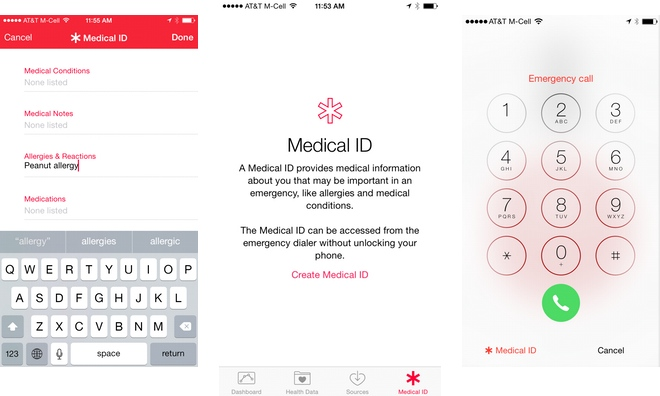One of the lesser known -- but potentially most important -- features of Apple's newly released iOS 8 mobile operating system is a digital "Medical ID," which can provide important personal health related information in the event of an emergency.

The Medical ID feature is built in to the new Health application found in iOS 8 for iPhone. Users can configure it by launching Health, tapping the Medical ID menu in the bottom right, and then choosing "Create Medical ID."
iPhone users with a passcode-locked handset can consider enabling the "Show When Locked" function, providing first responders or anyone else with emergency access to their Medical ID. Enabling this feature allows the Medical ID to be viewed by swiping the lock screen, tapping "Emergency," and then viewing the digital information.
A user's Medical ID can be configured with a custom picture and name, date of birth, list of medical conditions, notes, allergies, reactions and medications. It also allows users to display an emergency contact with name, telephone number, and relationship.
The Medical ID also allows users to enter their blood type, height and weight, and whether they are an organ donor. And if someone changes their mind about having such information available from their lock screen, all of the Medical ID information can be deleted via one button at the bottom of the editing page.
After the Medical ID has been created, users can always go back and make changes at any time through the Health app.
Medical ID is just one function of the new Health application in iOS 8, which aims to become a centralized repository for all of a user's health information, whether input manually or automatically collected through iPhone accessories.
The more advanced Health functions with connected applications and accessories have not yet gone live, as Apple apparently encountered last-minute bugs with its new HealthKit application programming interface tools for developers. Apple abruptly began pulling HealthKit-enabled applications from the App Store last week, alongside the launch of iOS 8, indicating that a formal launch for Health-compatible apps would come at a later date.
For more features and functions in iOS 8, see AppleInsider's ongoing iOS Tips series.